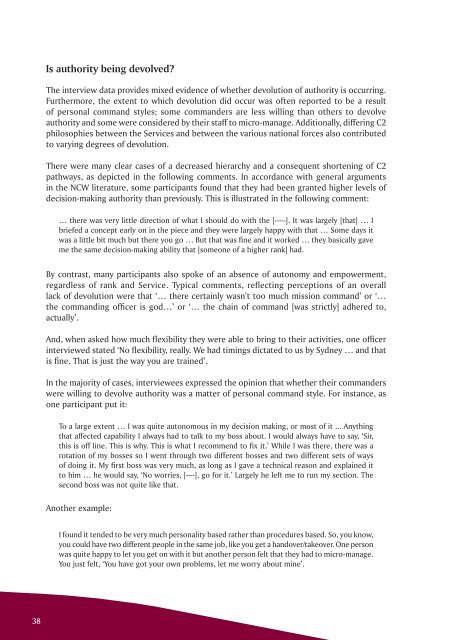ISSUE 176 : Jul/Aug - 2008 - Australian Defence Force Journal
ISSUE 176 : Jul/Aug - 2008 - Australian Defence Force Journal
ISSUE 176 : Jul/Aug - 2008 - Australian Defence Force Journal
Create successful ePaper yourself
Turn your PDF publications into a flip-book with our unique Google optimized e-Paper software.
Is authority being devolved?<br />
The interview data provides mixed evidence of whether devolution of authority is occurring.<br />
Furthermore, the extent to which devolution did occur was often reported to be a result<br />
of personal command styles; some commanders are less willing than others to devolve<br />
authority and some were considered by their staff to micro-manage. Additionally, differing C2<br />
philosophies between the Services and between the various national forces also contributed<br />
to varying degrees of devolution.<br />
There were many clear cases of a decreased hierarchy and a consequent shortening of C2<br />
pathways, as depicted in the following comments. In accordance with general arguments<br />
in the NCW literature, some participants found that they had been granted higher levels of<br />
decision-making authority than previously. This is illustrated in the following comment:<br />
… there was very little direction of what I should do with the [-----]. It was largely [that] … I<br />
briefed a concept early on in the piece and they were largely happy with that … Some days it<br />
was a little bit much but there you go … But that was fine and it worked … they basically gave<br />
me the same decision-making ability that [someone of a higher rank] had.<br />
By contrast, many participants also spoke of an absence of autonomy and empowerment,<br />
regardless of rank and Service. Typical comments, reflecting perceptions of an overall<br />
lack of devolution were that ‘… there certainly wasn’t too much mission command’ or ‘…<br />
the commanding officer is god…’ or ‘… the chain of command [was strictly] adhered to,<br />
actually’.<br />
And, when asked how much flexibility they were able to bring to their activities, one officer<br />
interviewed stated ‘No flexibility, really. We had timings dictated to us by Sydney … and that<br />
is fine. That is just the way you are trained’.<br />
In the majority of cases, interviewees expressed the opinion that whether their commanders<br />
were willing to devolve authority was a matter of personal command style. For instance, as<br />
one participant put it:<br />
To a large extent … I was quite autonomous in my decision making, or most of it ... Anything<br />
that affected capability I always had to talk to my boss about. I would always have to say, ‘Sir,<br />
this is off line. This is why. This is what I recommend to fix it.’ While I was there, there was a<br />
rotation of my bosses so I went through two different bosses and two different sets of ways<br />
of doing it. My first boss was very much, as long as I gave a technical reason and explained it<br />
to him … he would say, ‘No worries, [----], go for it.’ Largely he left me to run my section. The<br />
second boss was not quite like that.<br />
Another example:<br />
I found it tended to be very much personality based rather than procedures based. So, you know,<br />
you could have two different people in the same job, like you get a handover/takeover. One person<br />
was quite happy to let you get on with it but another person felt that they had to micro-manage.<br />
You just felt, ‘You have got your own problems, let me worry about mine’.<br />
38

















